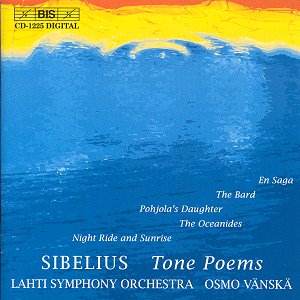Given the general excellence, so far, of the Osmo Vänskä
complete Sibelius series on BIS, it is tempting to say that this latest
instalment is virtually self-recommending. Indeed, the very first play-through
confirmed that recorded sound, committed orchestral playing, a generous
and well-planned programme and superb notes and presentation, kept things
well up to scratch. Further acquaintance revealed more riches, as one
realised how well shaped and intelligent are Vänskä’s interpretations
of some very familiar and oft-recorded repertoire.
A spacious and deeply felt performance of En Saga
opens the disc. My old college tutor, the late and much missed Harold
Truscott, used to refer to this piece as containing, in embryo, just
about every Sibelius ‘thumbprint’, all the unique qualities and originality
that would distinguish his later music. As usual, he was absolutely
right, and I think he would have enjoyed this performance. Vänskä’s
pacing seems to me virtually ideal, letting the phrases and paragraphs
unfold in a natural and unforced way. I have always rated Ashkenazy’s
Decca performance of this work (on an excellent compilation from his
classic 80s Sibelius series), but Vänskä probes that bit deeper.
Having said that, the playing of the Philharmonia, who always responded
to Ashkenazy, is definitely superior; in fact, it’s absolutely world-class.
But the Lahti band do their conductor proud, and what may be missing
in refinement is more than made up for in enthusiasm and characterisation.
If En Saga is one of the composer’s longest
symphonic poems, the next two on the disc are among the shortest and
possibly least well known. The Dryad was completed in 1910, while
Sibelius was working on the Fourth Symphony, and its sparse textures
and enigmatic melodic material seem to betray its proximity to that
towering masterpiece. It is an atmospheric piece with hints, in places,
of the impressionism of Debussy. The Dryad’s Op. 45 companion
piece is the brief Dance-Intermezzo, an excellent example of
Sibelius in lighter mood. The Lahti players clearly enjoy themselves,
and the extrovert orchestration is well realised.
The rest of the disc is given over to four mainstays
of the Sibelius repertoire, every one full of the brooding atmosphere
and awesome majesty that is so much a part of his mature music. Pohjola’s
Daughter, originally called Väinämoinen or L’aventure
d’un héros – an evident allusion to Strauss’s Ein Heldenleben,
which Sibelius had heard under the composer’s baton in Berlin in 1905
– is given a vital and beautifully shaped reading. Here the orchestra
really do excel themselves, and the excitement Vänskä whips
up in the central episode (around 8.55) is thrilling.
Night Ride and Sunrise, one of Sibelius’s greatest
inspirations, finds Vänskä and his forces again on top form,
with a real feeling for the architecture of the work. Again his pacing
is steady, though there is an inevitability about the momentum that
eschew surface excitement in favour of a gradual nobility. One can sense,
in this performance, Sibelius’s words regarding this piece "…I
was concerned with the inner experiences of an average man riding solitary
through the forest gloom; sometimes glad to be alone with nature; occasionally
awe-stricken by the stillness or the strange sounds which break it;
but thankful and rejoicing in the daybreak"
The Bard and The Oceanides date from
around the same time, and, in Robert Layton’s words, are " vintage
Sibelius, the composer at his most powerful and poetic". Even the
famously dismissive New York critic Olin Downes was moved to refer to
The Oceanides as "the finest evocation of the sea which
has ever been produced in music". Whether you agree with such a
sweeping statement or not, this is just as evocative as La Mer;
indeed, its orchestral tapestry and sound-world are, again, not a million
miles from that of impressionism, something which has not gone unnoticed
by Vänskä. His pacing and attention to detail in both works
is exemplary, and I can’t imagine either piece being brought off more
convincingly.
So, as a collection of major Sibelius tone poems, this
makes excellent sense for any collector. You may well have alternatives
(including BIS’s own rival series from Järvi), but Vänskä
is keeping up to the incredibly high standards he has set himself. I
guarantee you will have no cause for complaint.
Tony Haywood


